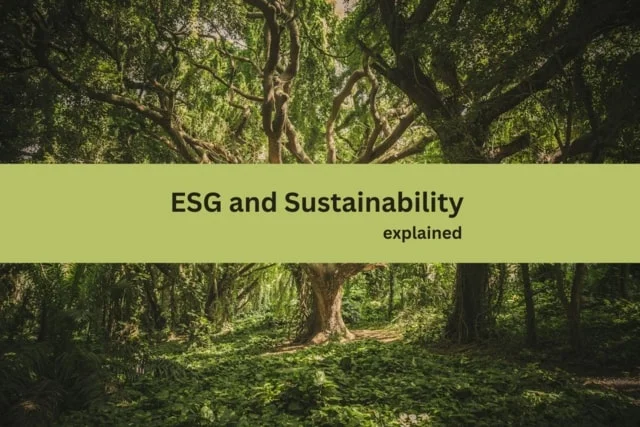Navigating the world of responsible business and investment can sometimes feel like learning a new language, especially with words like ESG and sustainability appearing so often. They might seem interchangeable at first glance, but they each represent unique concepts with their own implications.
What is the difference between ESG and sustainability?
In a nutshell, ESG refers to a set of specific, measurable criteria used to assess a company’s performance in environmental stewardship, social impact, and governance. Sustainability is a broader concept that encompasses the ability of a system to balance economic success with social welfare and environmental conservation over the long term.
As Per Karlberg, CEO at ProptechOS puts it:
ESG is a framework to guide behavior and investment decisions with the intention to achieve sustainability, which is the outcome of employing ESG.
What does ESG mean in sustainability?
Within the field of sustainability, ESG provides a specific framework to measure and improve sustainable practices in businesses and organizations. It helps in quantifying sustainability, making it tangible and actionable.
By adhering to the ESG framework, companies can systematically monitor and improve their sustainability performance across various factors. Thus, ESG serves as a roadmap that guides companies to achieve the broader goal of sustainability.
What is CSRD?
The Corporate Sustainability Reporting Directive (CSRD) mandates that companies disclose the effects of their operations on the environment and society. Additionally, it necessitates verifying this reported information through an auditing process. Corporations looking to report their sustainability can use the EU’s CSRD standard. This standard offers a transparent method for companies to publicly share information about their sustainability efforts with stakeholders and tenants.
So, what do US companies need to know about the EU’s CSRD? The CSRD impacts every company with operations or subsidiaries in the EU. This means US companies with any operations in the EU must still comply with the CSRD. It also extends to direct and indirect business relationships across the value chain.
ESG driving value for commercial real estate portfolio
ESG isn’t just another buzzword; it’s a powerful tool that can significantly enhance the value of a commercial real estate portfolio. Going green is no longer just about saving the planet—it’s about bolstering returns, cutting costs, and staying one step ahead of the competition.
Sustainability is important for investors
Investors’ focus on sustainability is intensifying, driven by several key trends:
- Expanding influence of millennial investors: Due to a massive wealth transfer, millennials, who have a strong focus on climate change and social issues, will hold five times their current wealth by 2030. As this generation grows in the workforce, their influence on sustainable business practices is increasing.
- Rapidly expanding business acceptance: ESG principles are gaining mainstream acceptance, with 66% of Fortune Global 500 companies making climate commitments. The rise in ESG has also led to more dedicated sustainability roles within firms.
- Value creation through ESG: A PwC survey reveals that 70% of private equity firms place value creation among the top reasons for their ESG activities. These firms recognize the role of ESG in enhancing their brand, mitigating risks, differentiating themselves, and attracting clients.
Improving investment performance and lowering costs
Adopting ESG principles can do more than just enhance your reputation—it can also improve your bottom line. By implementing energy-efficient systems and sustainable practices, you can reduce operational costs. But, why is energy efficiency on portfolio level important?
McKinsey & Company research found that effectively executing ESG can help combat rising operating costs. These rising costs can impact operating profits by up to 60% making ESG not just a sustainability measure, but a significant factor in financial performance.
New legislation, social factors, and directives
Several legislative measures, social factors, and directives globally are making ESG risk assessment and mitigation initiatives essential to the Commercial Real Estate (CRE) industry:
- U.S. Securities and Exchange Commission (SEC) initiatives: The SEC launched an ESG Enforcement Task Force in 2021. It proposed a requirement for public U.S. companies to disclose greenhouse gas (GHG) emissions and climate-related risks for calendar year 2023 operations by 2024.
- EU’s Sustainable Finance Disclosure Regulation (SFDR): The EU has established the SFDR, which mandates financial market participants to disclose sustainability information, supporting the EU’s objective of transitioning to a net-zero economy. This impacts CRE investments.
- EU Taxonomy: The EU’s taxonomy for sustainable activities defines criteria for economic activities aligned with a net zero trajectory by 2050 and broader environmental goals. It provides a common language for what is considered ‘sustainable’, and helps direct investments towards sustainable projects and activities.
- Local ordinances: Over 40 cities and eight states in the U.S. currently have requirements for commercial buildings to benchmark and report their energy use. New York City, Denver, Boston, and Washington D.C. have laws mandating GHG emissions reductions from large commercial buildings, with significant fines for non-compliance.
- Diversity, equity, and inclusion (DEI): DEI is an integral part of the ‘Social’ aspect of ESG. Many regulations focus on enhancing gender equity, recognizing its significant economic impact. A McKinsey Global Institute study estimated that improved gender equity in the workplace could add $28 trillion to the global economy by 2025.
- Greenwashing: With 68% of executives in the United States admitting to greenwashing, transparent reporting of sustainable efforts has become essential. To combat greenwashing, jurisdictions implement disclosure legislation for more consistent, transparent, and comparable ESG information.
Building resilience: Managing risks and costs in ESG-focused Real Estate
Implementing an ESG strategy in real estate can present challenges, but it’s also a powerful tool for building resilience in your portfolio. ESG principles help companies anticipate and manage potential risks related to environmental, social, and governance issues.
- By prioritizing environmental sustainability, companies can reduce their exposure to risks associated with climate change and resource scarcity.
- Social responsibility initiatives can improve tenant relationships and boost employee morale, reducing turnover risk and reputational damage.
- Good governance can lead to better decision-making and risk management, protecting the company from legal and regulatory issues.
Common trends and tools
Several key trends are shaping the ESG-focused real estate landscape:
- Increased regulation: Governments worldwide are enacting stricter sustainability and energy efficiency regulations, pushing CRE firms to incorporate ESG practices. Companies should monitor regulatory changes closely to stay compliant and leverage opportunities for more accurate and reliable reporting.
- Green building certifications: Green building certifications like LEED, BREEAM, and ESG green buildings are becoming more prevalent as they can add value to properties and attract environmentally conscious tenants.
- Investor demand for ESG integration: More investors are prioritizing ESG factors in their decision-making. Demonstrating strong ESG performance and transparent reporting can attract these investors.
- Tenant expectations: Tenants are increasingly demanding sustainable, healthy, and socially responsible buildings. CRE firms should focus on improving building sustainability and indoor environmental quality to meet these demands.
To manage ESG risk and cost, several tools and methodologies are commonly used:
- ESG risk assessment tools: These tools help identify, quantify, and manage ESG risks for a property or portfolio. CRE firms should integrate these tools into their risk management processes.
- Life-cycle assessment (LCA): LCA is a methodology for assessing environmental impacts associated with all stages of a product’s life, from raw material extraction through materials processing, manufacture, distribution, use, repair and maintenance, and disposal or recycling. CRE firms can use LCA to understand the full environmental impact of their buildings and make more sustainable choices in design, construction, and maintenance.
- Sustainability reporting tools: These tools help CRE firms track and report on their ESG performance. They typically incorporate auditable data allowing CRE firms to verify their reporting to stakeholders, tenants, and regulatory bodies.
Our app Certify – get started with ProptechOS
Certify by ProptechOS streamlines the process of building certification and compliance through automation.
- Automated certification & compliance: Continuous data streams enable performance tracking and anticipation of report and certification outcomes, giving organizations time to plan and implement strategic improvements. API integrations with reporting and certification authorities mean that both collecting and submitting data are automated.
- Sensor-driven certification: IoT sensors, connected meters and integrations with utility providers are utilized for year-round tracking, offering a more reliable picture than single sample measurements.
- Integration and templates: Certify is with USGBC LEED, GRESB and templates for EU Taxonomy Carbon Inventory and CSRD data for tenants’ reporting.
- Features of Certify: Connect digital twins of buildings and sensors and complement with other data points. Create report for sets of data points, with templates like GRESB, or custom reports. Set up workflows for automated or semi-automated report submission and programmatic verification of the reported data.
You can try ProptechOS for free today to see how our app Certify can amplify your ESG reporting efforts.
ESG key terms and glossary
- ESG: Stands for Environmental, Social, and Governance. ESG factors are criteria for evaluating a company’s operations in these three areas. Investment decisions are often influenced by a company’s ESG performance.
- Sustainability: In an ESG context, sustainability refers to a company’s ability to operate that does not deplete resources or harm societal structures, ensuring long-term business viability.
- Carbon footprint: A measure of the total greenhouse gas emissions caused by an individual, event, organization, or product, expressed as carbon dioxide equivalent.
- Green building: A building that, in its design, construction, or operation reduces or eliminates negative impacts and can create positive impacts on our climate and natural environment.
- LEED certification: Leadership in Energy and Environmental Design (LEED) is a certification program focused on encouraging the development of more sustainable buildings.
- Digital twin: A digital replica of a physical entity (like a building), which can be used for various purposes including performance optimization, data analysis, or troubleshooting.
- Sustainable investing: An investment strategy considering ESG factors in portfolio selection and management.
- Corporate Sustainability Reporting Directive (CSRD): The directive mandates companies to report on their environmental and societal impacts, with a compulsory audit to verify this information.
- Climate risk: The potential for financial loss due to climate change-related events, such as severe weather or long-term shifts in climate patterns.
- Circular economy: An economic system aimed at eliminating waste and the continual use of resources.

Per Karlberg
Per Karlberg, a distinguished technology executive, demonstrates deep expertise in the nexus of real estate, technology, and ESG. Holding advanced degrees from Lund University, and with key roles as CEO of our company and Co-Founder of ProptechOS, he has shaped the proptech field through significant contributions to real estate technology advancements. His instrumental work in co-authoring “The realestatecore ontology” has facilitated digital transformation and ESG breakthroughs in the real estate sector.
Read his full bio and information here.

